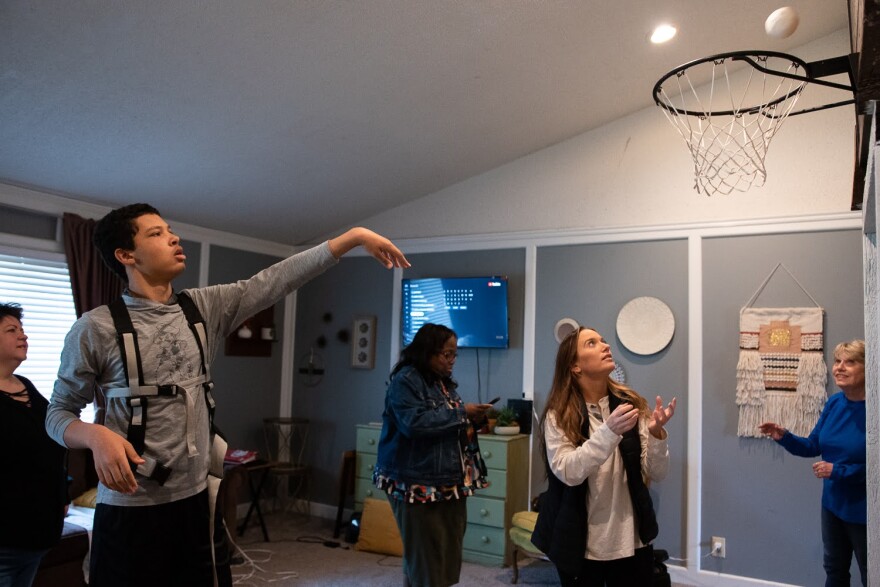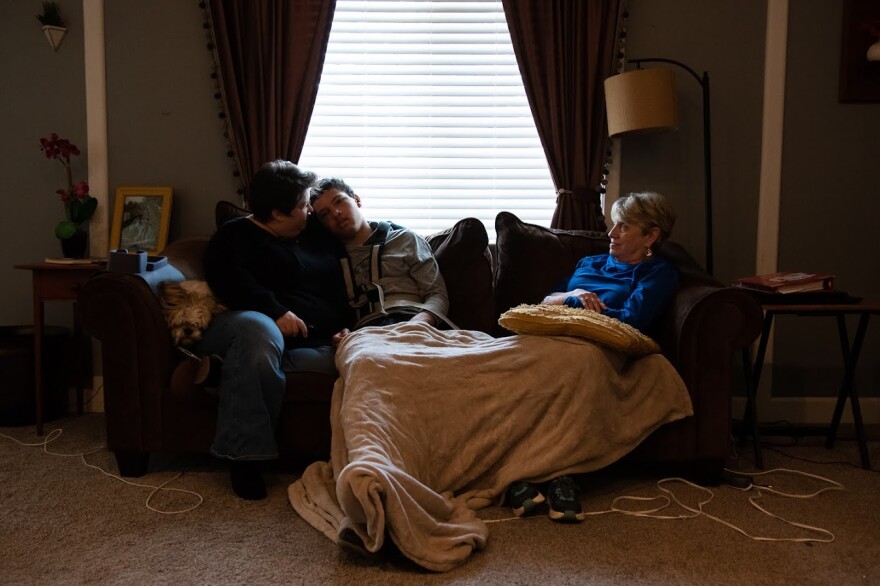JENKS — Andee Cooper can’t take a shower without risking her son’s life.
Kannon suffers from a rare disorder that causes daily seizures. He needs constant care, someone to soften his falls and keep him from choking by rolling him onto his side.
At 6-foot-4, he looks like a teenager but thinks and acts like a toddler.
One day last year, Cooper forgot to lock the door. When she got out of the shower, Kannon, 14, was gone. He was roaming their street naked and a neighbor called the police.
“He does not look disabled, so to a group of policemen he looks like a defiant teenager,” Cooper said. “That was scary and that's why we have a fence now that goes around the entire front yard.”
Cooper found hope in May when lawmakers finally approved $32.5 million to clear a 13-year waitlist for help that had grown to more than 5,000 Oklahomans. About 2,000 of them were children.
Since then, fewer than 10% have been approved for a Medicaid waiver to fund a range of services for low-income Oklahomans with intellectual and developmental disabilities.
Like Cooper, many of them are still without care due to the lack of providers — a problem likely to grow with thousands of Oklahomans expected to be approved in the next year.
Last fall, the state approved funding for a home health aide to help Kannon and his mom in their Jenks home for 20 hours per week. But Cooper, a single mom, is competing for care against other families, and big box stores.
In-home aides can make more money answering phones at Costco even after the state used part of last year’s allocation to raise wages. Many have quit for higher pay and less responsibility as the demand for care is spiking.
Since Kannon’s waiver was approved in October, the Coopers have had three case managers, who match families with needed services. The newest, Cheryl Dever, said she’s lost track of how many agencies she has called in search of in-home staff for Kannon.
Caregivers trained to work with people with cognitive disabilities like Kannon’s are called habilitation training specialists. They’re part of a network of home health workers whose ranks plummeted during the COVID-19 pandemic and haven’t recovered.
Demand for in-home care rose as families moved loved ones home from residential facilities vulnerable to the virus. At the same time, children learning from home and fears of becoming sick and infecting patients prompted many caregivers to quit, said Alice Burns, who studied the issue as an associate director at the Kaiser Family Foundation.
A 25% pay increase was part of last year’s allocation from lawmakers. Oklahoma caregivers are making an average of $12.50 an hour. A search of Oklahoma City-area job postings found entry-level positions at Best Buy, Dillard’s and Costco starting at $15 an hour. In order to reach national standards, another 20% increase is needed, according to a statereport comparing caregiver wages.
Picking up a 180-pound teenager from the floor after a seizure or lifting someone from a wheelchair is physically demanding. Some providers are tasked with feeding or bathing patients. Others are responsible for administering medication. All have another’s life in their hands.
Alexis Clampitt spent 2017 caring for an Oklahoma woman in her 20s, who is nonverbal, autistic, blind and has a brain disorder.
“It's not just taking care of someone that is unable to take care of themselves,” Clampitt said. “It is taking care of someone who has multiple ways they could die daily and you have to prevent that. And then they want to pay you $9 an hour and you've got your own family too.”
Clampitt said the job required minimal training, which consisted mostly of watching videos. The best training came from the family of the woman she cared for 12 hours a day, four days a week. Clampitt quit after about a year when she could no longer afford childcare.

How Budget Cuts Fed the Wait List
In the 2000s, an oil bust and a recession resulted in budget shortfalls prompting agencies to strip services from some of the most vulnerable Oklahomans.
Court orders following a 2008 lawsuit alleging the state failed to protect children in state custody led the Department of Human Services to cut elsewhere. One casualty was disability care.
Services for Oklahomans with autism, cerebral palsy, Down Syndrome, brain injuries and intellectual disabilities faced even deeper cuts when federal contributions, which are determined by state funding, plummeted.
In 2016, the agency threatened to stop funding in-home care for adults. The American Civil Liberties Union of Oklahoma sued over the proposed cuts.
The move made national news and rallied distraught families who put pressure on the Department of Human Services. Lawmakers took notice and launched a bipartisan caucus focused on disability services.
In-home services remained and the lawsuit was dismissed.
New waivers relied on attrition leaving nearly 8,000 Oklahomans waiting in 2018 – the longest waitlist in state history.
Yearly allocations of $1 or $2 million chipped away at the list until last year when lawmakers appropriated enough money to eliminate the list, according to estimates from the Department of Human Services.
Celebration ensued. A television commercial lauded future promises to serve vulnerable Oklahomans. Agency leaders joined Gov. Kevin Stitt, lawmakers and a family recently approved for services to praise the progress.
Meanwhile, thousands of families remain desperate for help.
The agency sorted the list into groups and in June started processing 340 Oklahomans who’ve waited the longest. Nearly one-third of them are receiving some services. Another 10% have been approved and are searching for care, which includes summer camps, behavioral therapy, job training, group home living and in-home help.
Half of the first group was denied or rejected services. Some didn’t qualify, most often because they didn’t meet the IQ requirement of 70 or below, said Beth Scrutchins, who oversees state disability services. Others had outdated contact information, no longer needed services or didn’t want the hassle of paperwork and assessments, she said. Some have been difficult to find due to outdated contact information. At least four Oklahomans in the first group died while waiting for help.
It is expected that about 40% of Oklahomans still waiting will be approved for services, according to a report provided by the agency.

‘A Different Kind of Care and Peace of Mind’
Some family members are forced to quit their jobs to stay home and care for a loved one while they wait on their waiver or search for care.
Single parents like state Rep. Ellyn Hefner don’t have that option. Hefner, D-Oklahoma City, made the push to fund disability services a pillar of her 2022 campaign. Her youngest son, William, 18, has an intellectual disability and life-threatening seizures that require constant supervision but is able to work part-time at an Oklahoma City coffee shop.
After more than a decade of waiting, William was approved for services in January. Hefner knew finding a trained care provider would further delay the help she needed, so she used government assistance to hire one of her son’s coworkers, Jared Cooling.
The waivers can be used to pay a family member, neighbor, friend, or church member to provide care.
Days after Hefner’s first payment, Cooling saved William’s life. William was walking on a treadmill at the gym when he seized, fell and hit his head. Cooling administered rescue medication, proving the importance of support services, Hefner said.
“Before that, because I was working and the waiver wasn't in place, I had volunteers watching my son, just anyone I could find,” Hefner said. “But we trained Jared on this and it’s just a different kind of care and peace of mind.”

Caroline Jarvis of Edmond hired someone who worked at her adult son’s former group home. After driving Jonathan to and from work, cooking his meals and making sure he took daily showers, the worker quit in August. Jarvis has struggled to find reliable help ever since.
“The agencies can’t provide the help we need and when we do find one that will work with us, their turnover is so high that we end up constantly teaching new people what to do or in some cases they just don’t show up for shifts,” Jarvis said. “So as the parents, we end up filling those needs even though we have the waiver.”
When she does have help, Jarvis said the waiver allows her son to live independently, work and be part of his Edmond community.
An in-home worker would also expand Kannon Cooper’s access to his community. He loves cheering at Jenks Middle School basketball games and donning his Pistol Pete shirt at Oklahoma State University baseball games. Without help, these outings are nearly impossible, his mother said.
Andee Cooper said misunderstandings about people with disabilities and their value perpetuates the workforce shortage.
“Those jobs aren’t valued because the people they’re caring for aren’t valued,” she said. “We aren’t looking at our most vulnerable, those that don't have a voice at all in the community because their parents are too tired. We don’t have the help we need and we’re too tired to fight for it.”

Oklahoma Watch, at oklahomawatch.org, is a nonprofit, nonpartisan news organization that covers public-policy issues facing the state.
Copyright 2023 KGOU. To see more, visit KGOU. 9(MDA4OTAxNzAzMDEzMjc0MTc2MzA5ZDZlMw004))








